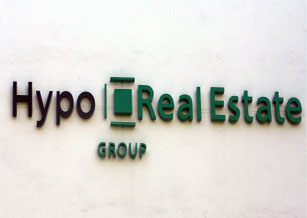HRE shareholders rally against government squeeze-out
 Munich - The last remaining shareholders of nationalized German mortgage lender Hypo Real Estate (HRE) rallied against government plans to squeeze them out at the company's annual meeting on Thursday.
Munich - The last remaining shareholders of nationalized German mortgage lender Hypo Real Estate (HRE) rallied against government plans to squeeze them out at the company's annual meeting on Thursday.
"Us shareholders are faced with expropriation following the state's involvement," one investor told more than 1,700 other shareholders gathered in Munich.
HRE's chief executive Axel Wieandt defended the state's controversial takeover of the ailing bank, saying there had been no alternatives.
German Chancellor Angela Merkel's government has come under strong criticism for a 100-million-euro (142-million-dollar) bailout package and the subsequent nationalization of HRE, implemented against the will of many shareholders. Representatives from the finance and economics ministries now sit on the bank's supervisory board.
The state now owns more than 90 per cent of the bank, and plans a so-called squeeze-out to eject the remaining investors, in exchange for a compensation payment. This process is due to be finalized at a shareholders' meeting later in the year.
Tempers were frayed during the 11-hour gathering, at which journalists were barred from recording sound or taking pictures.
In particular, investors voiced criticism over a one-off 500,000- euro payment to Wieandt, after the state takeover had capped his salary significantly below his previous income.
The head of the supervisory board, Michael Endres, countered that the chief executive deserved the compensation, adding, "Mr Wieandt turned down considerable funds."
Wieandt, who is charged with restructuring the bank, said the process would take several years. "We are currently not expecting to return to profits before 2012," the chief executive said.
During the first half of 2009, HRE accumulated losses of more than a billion euros. Wieandt said the company was dependent on extensive support for the foreseeable future.
During the meeting, shareholders decided to appoint a special auditor to find out what had brought the mortgage lender to the brink of collapse.
In particular, investors sought information about HRE's 5-billion- euro takeover of Dublin-based state financer Depfa in 2007, which dragged the German bank down when it became unable to refinance long- term credits.
Many investors felt an audit would not go far enough.
"A special audit cannot be a short-term tranquilizer for shareholders," said Daniela Bergdolt of Germany's DSW association, which represents investors' interests.
Bergdold insisted that every final detail of processes occurring at HRE needed to be researched and published.
A new, smaller supervisory board was also voted in by virtue of the government's ability to leverage its majority on the board. All those who had been appointed last autumn were voted off the board, which was halved to six members.
The new board consists of Bernd Thiemann, former head of DG Bank, Hedda von Wedel from the Federal Court of Auditors, Morgan Stanley's former German head Dagmar Kollmann, Albert Peters from the Finance Ministry, KfW-board member Guenther Braeunig and Alexander Gross from the Economics Ministry.(dpa)